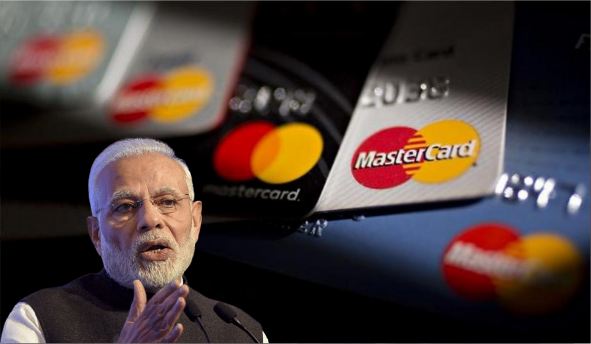In July, India had barred American financial services giant, Mastercard from adding new customers in the country. Mastercard is a major financial services company, but its reluctance to fall in line with Indian regulations led to the Indian government snapping the multinational company’s growth in India. India is a major financial market, and one of the fastest-growing ones at that. In a country like India, where digital transactions have soared since November 2016, following the massive demonetisation exercise launched by Prime Minister Narendra Modi, financial service companies had hoped to make it big. Mastercard would have too, had it complied with Indian regulations.
Ever since, the United States of America has launched a tirade against India. It has subtly threatened the Modi government, calling the barring of Mastercard “discriminatory and trade-distortive”. However, the Modi government has not really paid much attention to Washington’s rants, which is why the U.S. has now taken its case to the press.
US Calls India’s Decision ‘Draconian’
Following two months of intense lobbying aimed at overturning the decision of the Indian government, the U.S. has now resorted to complaining to the media. Speaking to Reuters, a senior U.S. trade official privately criticised India’s July decision to ban Mastercard Inc from issuing new cards, calling it a “draconian” move that caused “panic”. Brendan A. Lynch, the deputy assistant U.S. trade representative for South and Central Asia was quoted out of his July emails as saying, “We’ve started hearing from stakeholders about some pretty draconian measures that the RBI has taken over the past couple days.”
Alexander Slater, the deputy managing director of the US-India Business Council, which lobbies for American business interests said last month, “The free flow of data across borders is the bedrock of a robust strategic and economic relationship between the US and India.” According to estimates, Mastercard accounts for one-third of India’s card market.
Reuters reported that the ban on Mastercard triggered a flurry of emails between US officials in Washington and India as they discussed the next steps with Mastercard, including approaching the RBI. Lynch asked his colleagues in India to get in touch with their central bank contacts “to see what’s going on”. However, these pressure tactics of Washington have yielded no results.
Apart from Mastercard, the Reserve Bank of India (RBI) in April took similar action against American Express and Diners Club too.
What is India Saying?
India has clarity of thought. If foreign companies want to do business in India, they must comply with the reasonable regulations in place in the country. It is the least they can do in one of the world’s biggest and expansive markets. According to Reuters, RBI acted against Mastercard because it was “found to be non-compliant” with the 2018 rules despite the “lapse of considerable time and adequate opportunities”.
According to one Indian executive quoted by the Financial Times, the data localisation rule “has been very, very clear for a very long time…Some of the foreign companies would rather sit and lobby rather than fix their systems.”
Read more: How RBI’s MasterCard ban is helping VISA, UPI and RuPay
In a July 14 order, barring Mastercard from adding new Indian customers from July 22, the RBI said. “The Reserve Bank of India (RBI) has today imposed restrictions on Mastercard Asia / Pacific Pte. Ltd. (Mastercard) from on-boarding new domestic customers (debit, credit or prepaid) onto its card network from July 22, 2021. Notwithstanding the lapse of considerable time and adequate opportunities being given, the entity has been found to be non-compliant with the directions on Storage of Payment System Data.”
What Do the Rules Say?
Around 2018, India forbade financial groups from storing data overseas. The new rules require that all financial data originating from India, but processed overseas be destroyed within 24 hours and stored only in India. Companies must submit third-party audits showing compliance, which the RBI says is necessary to prevent money laundering and other illegal activity.
The companies at the receiving end for non-compliance with the rules argue, however, that the rules were costly, counterproductive and encouraged other countries to take similar steps.
Under Prime Minister Narendra Modi’s leadership, India is doing what was required to be done long ago. The data of companies’ services in the country, and all transactions must be stored locally. This will help the RBI track money laundering and take note of suspicious transactions with relative ease. However, American giants are more interested in ranting against India’s realistic regulations, instead of getting their act straight. Notwithstanding the intense lobbying by such companies, and the indirect threats of the U.S. government, the Modi administration is standing tall and ensuring that those who do not comply with regulations are punished.
